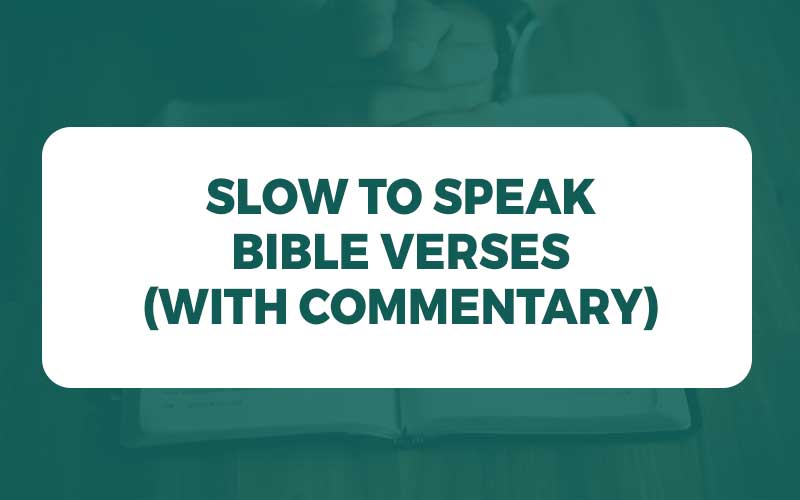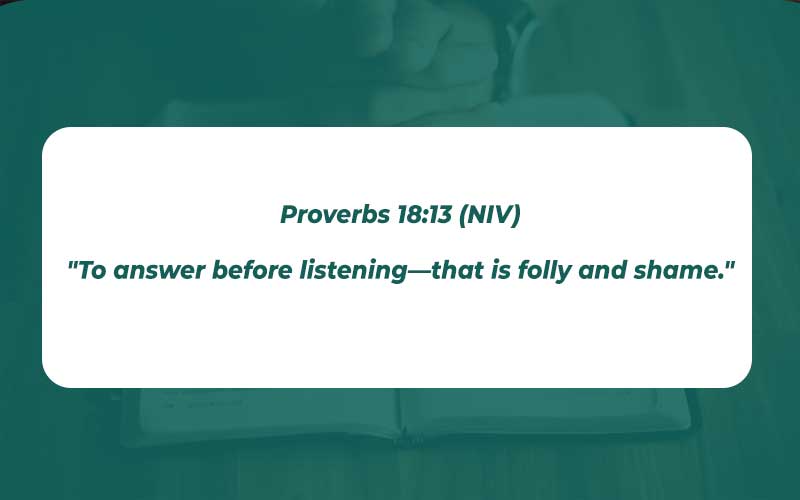The concept of being “slow to speak” is a timeless and valuable virtue that finds its roots in ancient wisdom, particularly in the teachings of the Bible.
In a world filled with instant communication and quick reactions, the idea of pausing before speaking and carefully considering our words is increasingly relevant. This virtue goes beyond mere restraint; it involves wisdom, self-control, empathy, and a desire for effective communication.
In this exploration, we delve into the rich tapestry of biblical verses and insights that illuminate the significance of being slow to speak. We discover how this principle can lead to healthier relationships, wiser decisions, and a more profound connection with our faith.
Also Read: Bible Verses About Sisters (with Commentary)
Slow to Speak Bible Verses
James 1:19 (NIV)
“My dear brothers and sisters, take note of this: Everyone should be quick to listen, slow to speak and slow to become angry.”
James 1:19 offers sage advice on the importance of being slow to speak. It forms a fundamental principle of effective communication and maintaining healthy relationships. By emphasizing the virtues of listening and delaying our response, we can avoid hasty words and impulsive reactions. Being slow to speak allows us to better understand others’ perspectives and respond with grace and wisdom.
Proverbs 10:19 (NIV)
“Sin is not ended by multiplying words, but the prudent hold their tongues.”
Proverbs 10:19 highlights the perils of excessive speech and the wisdom of holding one’s tongue. Being slow to speak is associated with prudence, recognizing that a flood of words does not necessarily resolve conflicts or bring about righteousness. This verse encourages us to exercise restraint in our speech, considering the impact of our words before uttering them.
Proverbs 15:28 (NIV)
“The heart of the righteous weighs its answers, but the mouth of the wicked gushes evil.”
Proverbs 15:28 underscores the discernment exercised by the righteous in their responses. Being slow to speak involves thoughtful consideration and evaluation of our words. The contrast with the mouth of the wicked, which gushes evil, highlights the importance of speaking with wisdom, integrity, and righteousness.
Ecclesiastes 5:2 (NIV)
“Do not be quick with your mouth, do not be hasty in your heart to utter anything before God. God is in heaven and you are on earth, so let your words be few.”
Ecclesiastes 5:2 addresses the reverence we should have when speaking, especially in the presence of God. Being slow to speak is an act of humility, recognizing the vast difference between the finite human and the infinite Creator. This verse reminds us to choose our words carefully, especially when addressing the Almighty.
Proverbs 17:27-28 (NIV)
“The one who has knowledge uses words with restraint, and whoever has understanding is even-tempered. Even fools are thought wise if they keep silent, and discerning if they hold their tongues.”
Proverbs 17:27-28 extols the virtues of using words with restraint and maintaining silence when necessary. Being slow to speak is associated with knowledge, understanding, and discernment. It emphasizes that even those lacking wisdom can appear wise if they refrain from speaking impulsively. This verse encourages us to prioritize thoughtfulness and discernment in our speech.
Proverbs 29:11 (NIV)
“Fools give full vent to their rage, but the wise bring calm in the end.”
Proverbs 29:11 illustrates the contrast between the foolish and the wise in their expression of emotions. Those who are quick to speak in anger often stir up strife and turmoil, while the wise, who are slow to speak, have the ability to bring about calm and resolution. This verse underscores the wisdom of maintaining composure and thoughtfulness in our responses, especially in moments of anger.
Proverbs 21:23 (NIV)
“Those who guard their mouths and their tongues keep themselves from calamity.”
Proverbs 21:23 emphasizes the protective aspect of being slow to speak. By guarding our mouths and tongues, we not only prevent harm to others but also shield ourselves from unnecessary trouble and calamity. This verse reminds us of the profound impact our words can have and encourages us to exercise caution and restraint.
Proverbs 18:13 (NIV)
“To answer before listening—that is folly and shame.”
Proverbs 18:13 highlights the folly of responding hastily without first listening and understanding the context. Being slow to speak involves a deliberate practice of active listening and seeking comprehension before offering a response. This verse serves as a reminder to avoid making hasty judgments or statements without proper consideration.
Proverbs 12:18 (NIV)
“The words of the reckless pierce like swords, but the tongue of the wise brings healing.”
Proverbs 12:18 draws a vivid contrast between the destructive power of reckless words and the healing impact of wise speech. Being slow to speak aligns with wisdom and promotes healing and reconciliation. This verse underscores the responsibility we have to choose our words carefully to bring about positive outcomes.
James 3:2 (NIV)
“We all stumble in many ways. Anyone who is never at fault in what they say is perfect, able to keep their whole body in check.”
James 3:2 acknowledges the universal struggle to control our speech and highlights the significance of being slow to speak. It recognizes that mastery over our words is a challenging endeavor. This verse encourages us to aspire to greater maturity in our speech, knowing that it reflects our character and self-control.
Proverbs 15:1 (NIV)
“A gentle answer turns away wrath, but a harsh word stirs up anger.”
Proverbs 15:1 underscores the power of a gentle response over a harsh one. Being slow to speak is intimately connected to responding with gentleness and grace, even in challenging situations. This verse teaches us that our words have the ability to either diffuse or escalate conflicts, emphasizing the importance of choosing our words carefully.
Ephesians 4:29 (NIV)
“Do not let any unwholesome talk come out of your mouths, but only what is helpful for building others up according to their needs, that it may benefit those who listen.”
Ephesians 4:29 provides a clear directive on the type of speech believers should cultivate. Being slow to speak involves considering the impact of our words on others and speaking words that build up, encourage, and benefit those who hear them. This verse reminds us of the transformative power of positive and edifying speech.
Proverbs 14:29 (NIV)
“Whoever is patient has great understanding, but one who is quick-tempered displays folly.”
Proverbs 14:29 highlights the connection between patience and understanding. Being slow to speak is a manifestation of patience, which leads to greater wisdom and discernment. This verse encourages us to cultivate patience in our interactions, recognizing that hasty reactions often lead to foolishness.
Colossians 4:6 (NIV)
“Let your conversation be always full of grace, seasoned with salt, so that you may know how to answer everyone.”
Colossians 4:6 instructs believers to maintain conversations characterized by grace and wisdom. Being slow to speak involves seasoning our words with salt, which signifies wisdom and discernment. This verse challenges us to continually seek ways to respond with grace and wisdom to everyone we encounter.
Proverbs 16:32 (NIV)
“Better a patient person than a warrior, one with self-control than one who takes a city.”
Proverbs 16:32 extols the virtue of patience and self-control. Being slow to speak is a manifestation of self-control in our speech. This verse emphasizes that exercising patience and self-control in our interactions is a greater achievement than conquering physical challenges. It encourages us to prioritize calm and measured responses.
Proverbs 25:28 (NIV)
“Like a city whose walls are broken through is a person who lacks self-control.”
Proverbs 25:28 draws a vivid analogy, comparing a person lacking self-control to a city without walls. Being slow to speak is an expression of self-control, which serves as a protective barrier for our words and emotions. This verse underscores the importance of self-discipline in guarding our speech and maintaining healthy boundaries.
Ecclesiastes 3:7 (NIV)
“a time to tear and a time to mend, a time to be silent and a time to speak,”
Ecclesiastes 3:7 recognizes that there is a season for everything, including moments of silence and moments of speech. Being slow to speak involves discerning the appropriate timing for our words. This verse reminds us that sometimes silence is more fitting than immediate speech and that wisdom lies in knowing when to speak and when to hold our tongues.
Proverbs 18:2 (NIV)
“Fools find no pleasure in understanding but delight in airing their own opinions.”
Proverbs 18:2 highlights the folly of those who prioritize expressing their opinions over understanding others. Being slow to speak involves a commitment to understanding and empathizing with others before sharing our own viewpoints. This verse encourages us to seek understanding rather than rushing to voice our opinions.
Proverbs 15:2 (NIV)
“The tongue of the wise adorns knowledge, but the mouth of the fool gushes folly.”
Proverbs 15:2 underscores the role of wisdom in adorning knowledge. Being slow to speak is a hallmark of wisdom, as it allows us to carefully select our words and communicate knowledge effectively. This verse contrasts the wise, who use their tongues wisely, with fools who speak without discernment.
Proverbs 16:23 (NIV)
“The hearts of the wise make their mouths prudent, and their lips promote instruction.”
Proverbs 16:23 emphasizes the connection between a wise heart and prudent speech. Being slow to speak is a manifestation of a wise heart that promotes instruction and edification through words. This verse encourages us to cultivate wisdom in our hearts, which will naturally lead to thoughtful and instructive speech.
Proverbs 10:32 (NIV)
“The lips of the righteous know what finds favor, but the mouth of the wicked only what is perverse.”
Proverbs 10:32 underscores the distinction between the speech of the righteous and the wicked. Being slow to speak is a characteristic of the righteous, who choose words that find favor. This verse encourages us to be intentional about our speech, selecting words that reflect righteousness and bring about positive outcomes.
James 3:8-9 (NIV)
“But no human being can tame the tongue. It is a restless evil, full of deadly poison. With the tongue, we praise our Lord and Father, and with it, we curse human beings, who have been made in God’s likeness.”
James 3:8-9 acknowledges the challenge of taming the tongue. Being slow to speak requires recognizing the potential for our speech to harm as well as to glorify God. This passage serves as a reminder of the dual nature of our words and the importance of using them with care and reverence.
Proverbs 10:19 (NIV)
“Sin is not ended by multiplying words, but the prudent hold their tongues.”
Proverbs 10:19 highlights the futility of excessive speech in addressing sin. Being slow to speak is associated with prudence and self-control. This verse reminds us that the quantity of words does not necessarily lead to righteousness; rather, it is the prudent who exercise restraint and choose their words wisely.
Proverbs 13:3 (NIV)
“Those who guard their lips preserve their lives, but those who speak rashly will come to ruin.”
Proverbs 13:3 emphasizes the significance of guarding our lips. Being slow to speak is a form of self-preservation, protecting us from the consequences of rash and impulsive speech. This verse encourages us to exercise caution in our words to avoid bringing ruin upon ourselves.
James 1:26 (NIV)
“Those who consider themselves religious and yet do not keep a tight rein on their tongues deceive themselves, and their religion is worthless.”
James 1:26 addresses the connection between religious practice and speech. Being slow to speak is an integral part of authentic faith. This verse cautions against self-deception and highlights the importance of aligning our speech with our beliefs, emphasizing that uncontrolled speech can render one’s religion worthless.
Proverbs 21:23 (NIV)
“Those who guard their mouths and their tongues keep themselves from calamity.”
Proverbs 21:23 underscores the importance of guarding our speech. Being slow to speak involves a deliberate effort to control our words, preventing us from speaking thoughtlessly and causing harm. This verse reminds us that a guarded tongue is a safeguard against potential calamity and trouble in our lives and relationships.
Proverbs 14:17 (NIV)
“A quick-tempered person does foolish things, and the one who devises evil schemes is hated.”
Proverbs 14:17 highlights the correlation between a quick temper and foolish actions. Being slow to speak is closely linked to controlling one’s temper and avoiding impulsive behavior. This verse serves as a cautionary reminder that rushing to speak or react can lead to unwise decisions and strained relationships.
Proverbs 25:15 (NIV)
“Through patience a ruler can be persuaded, and a gentle tongue can break a bone.”
Proverbs 25:15 emphasizes the power of patience and a gentle tongue. Being slow to speak involves the use of gentle and persuasive words rather than forceful or hasty speech. This verse teaches us that patient and gentle communication has the potential to bring about positive change and resolution.
 Proverbs 16:24 (NIV)
Proverbs 16:24 (NIV)
“Gracious words are a honeycomb, sweet to the soul and healing to the bones.”
Proverbs 16:24 portrays the impact of gracious words as sweet and healing. Being slow to speak includes choosing words that are gracious and uplifting, offering comfort and healing to those who hear them. This verse encourages us to recognize the sweetness and restorative power of kind and considerate speech.
James 3:13 (NIV)
“Who is wise and understanding among you? Let them show it by their good life, by deeds done in the humility that comes from wisdom.”
James 3:13 challenges believers to demonstrate wisdom and understanding through their actions and humility. Being slow to speak is a manifestation of humility, as it reflects a willingness to listen and learn before speaking. This verse reminds us that wisdom is not merely expressed through words but through a life marked by humility and good deeds.
Also Read: Bible Verses About Consistency (with Commentary)
What Does the Bible Say About Being Slow to Speak
The Bible offers profound wisdom and guidance on the virtue of being slow to speak. While the phrase “slow to speak” may not be explicitly used, biblical principles emphasize the importance of measured, thoughtful, and considerate speech.
Here are key teachings from the Bible on this subject:
James 1:19 (NIV): “My dear brothers and sisters, take note of this: Everyone should be quick to listen, slow to speak, and slow to become angry.”
In this verse, James explicitly encourages believers to be slow to speak. He emphasizes that a measured response, marked by listening and patience, is a key component of righteous living.
Proverbs 29:20 (NIV): “Do you see someone who speaks in haste? There is more hope for a fool than for them.”
This Proverb highlights the folly of speaking hastily. Being slow to speak is contrasted with impulsive speech, with the latter being associated with foolishness.
Proverbs 17:27-28 (NIV): “The one who has knowledge uses words with restraint, and whoever has understanding is even-tempered. Even fools are thought wise if they keep silent, and discerning if they hold their tongues.”
These verses emphasize the power of using words with restraint. Being slow to speak is linked to understanding and discernment, and it can even give the appearance of wisdom, contrasting with those who speak impulsively.
Ecclesiastes 5:2 (NIV): “Do not be quick with your mouth, do not be hasty in your heart to utter anything before God. God is in heaven and you are on earth, so let your words be few.”
This verse underscores the reverence and caution with which we should approach speaking, particularly in the presence of God. Being slow to speak acknowledges the vast difference between the divine and the human, encouraging us to choose our words carefully.
Prayer for Wisdom and Self-Control
Heavenly Father,
We come before You with hearts humbled by the wisdom and guidance found in Your Word. Today, we seek Your help in cultivating the virtue of being slow to speak in our lives.
Grant us, Lord, the self-control to guard our tongues, especially in moments of anger and frustration. Help us resist the temptation to react hastily, knowing that a quick temper often leads to unwise actions and hurtful words. Instead, instill in us the patience and gentleness to respond with grace and understanding.
Teach us the value of using our words to heal, uplift, and bring comfort to those in need. May our speech be seasoned with kindness and wisdom, reflecting the sweetness of Your love. Guide us to speak words that find favor and promote peace in our relationships.
Above all, Lord, help us to embody humility, recognizing that true wisdom is displayed not only in our words but also in our actions. Grant us the wisdom and discernment to be slow to speak and quick to listen, allowing Your truth to guide our thoughts and expressions.
As we strive to be slow to speak, may our lives become a testimony to the transformative power of Your presence. We commit this journey to You, seeking Your strength and guidance in our pursuit of this virtue.
In Jesus’ name, we pray.
Amen.


